Dr. Hulbert's Accomplishments/Biography
“Crusader for Korea Who
Loved Korea More Than Koreans Themselves”
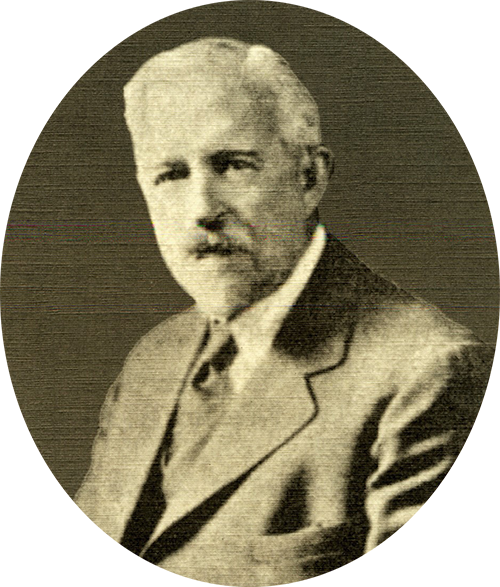
“I would rather be buried in Korea than in Westminster Abbey.”
Homer Bezaleel Hulbert
(1863.1.26~1949.8.5)
‘A Conscience of History Beyond Ethnics and Border
Who Loved Korea More than Koreans Themselves’
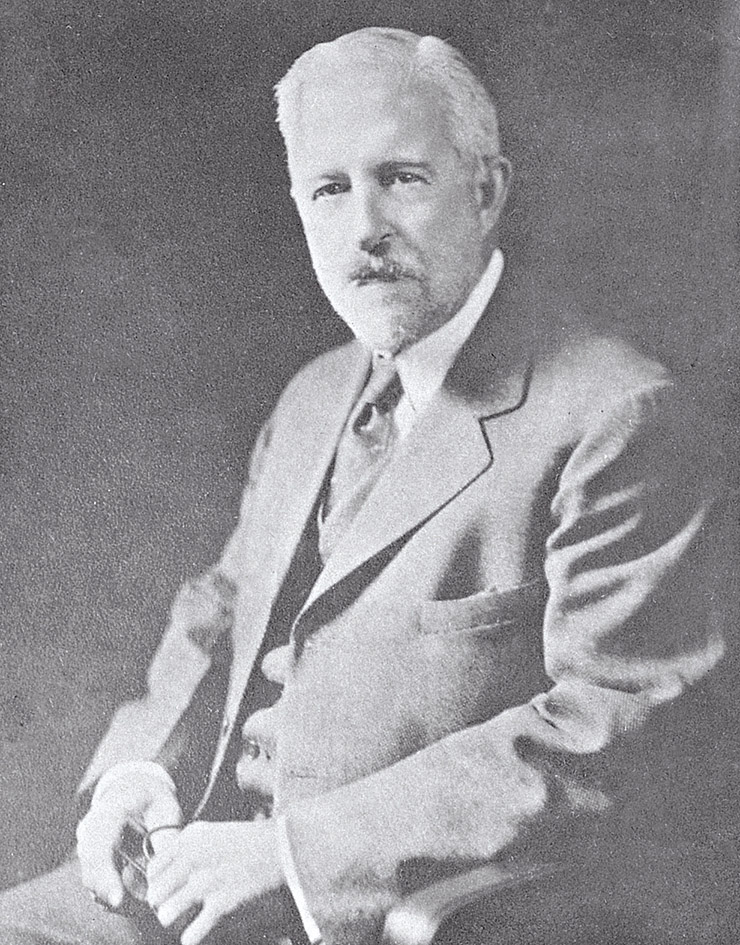
Homer B. Hulbert
In the course of Korea’s modernization in late 19th century and independence movement against Japan from 1905 to 1945, there was a unparalleled human being who invaluably contributed to Korea. The one is Homer Bezaleel Hulbert who encountered with Korea at the age of 23 and lived for 63 years only for Korea’s sake until he passed away in 1949.
Dr. Hulbert, an American born in Vermont in 1863 under the parents of college president(father) and a descendent of the founder of Dartmouth college(mother), landed in Korea to be a teacher of Korea‘s first state-run modern school in Korean history on July 5, 1886 at the invitation of 26th King Gojong of Joseon Kingdom. He graduated from Dartmouth College, one of ivy league, in 1884 and entered Union Theological Seminary in New York, but dropped out of the Seminary in 1886 to come to Korea. He thereafter lived as educator, linguist, journalist, historian, missionary, special envoy of the Korean Emperor, and advocate of Korean independence for two decades in Korea until he was expelled by Japan in 1907.
Homer Hulbert, rechristened by the writer as ‘a man who loved Korea more than Koreans themselves’ was a pioneer of Korean education, Hangeul(Korean alphabet), journalism, Korean studies, and a settler of christianity together with other missionaries who came early in Korea, and most importantly an ardent activist for independence of Korea against the gathering cloud of Japanese domination. Dr. Hulbert’s living never deviated from very stern spirits of the 19th century christianity prevailed in north-east of America and family tradition of justice, humanity and right patriotism while living, which crucially impacted Korean elites on their efforts for the civilization and independence movement. Dr. Hulbert’s major accomplishments are as follows:
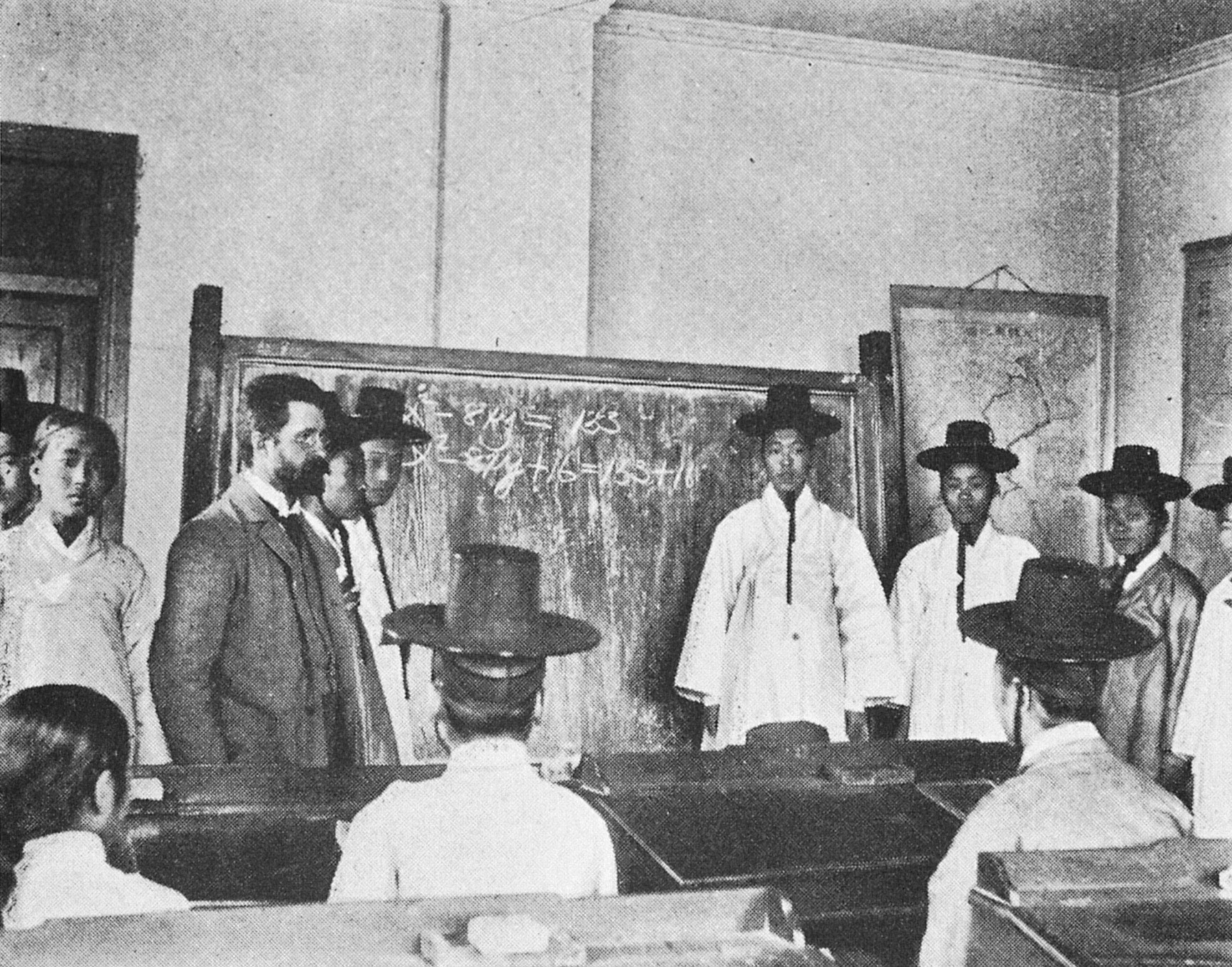
Homer Hulbert teaching at middle school in 1900’s
Father of Korea’s Modern Education
Dr. Hulbert began his life in Korea by teaching at YukYeongGongWon(육영공원 Royal College), and further taught at Korea’s phenomenal schools like PaiChaiHakDang(배재학당), HanSeong Normal School(한성사범학교 currently Seoul National University), the first state-run middle school(관립중학교 currently KyeongGi High School) for two decades. As a first teacher of the Korea’s first modern school he designed road map for the establishment of modern educational system in Korea, and appealed to Korean people that only education is the answer for the future of Korea. Furthermore he established textbook system publishing 15 textbooks under his initiatives, and tremendously influenced Korean students for their advancement to be true intellectual and right patriot. Many his students served Korea for the country’s modernization and independent sovereignty.
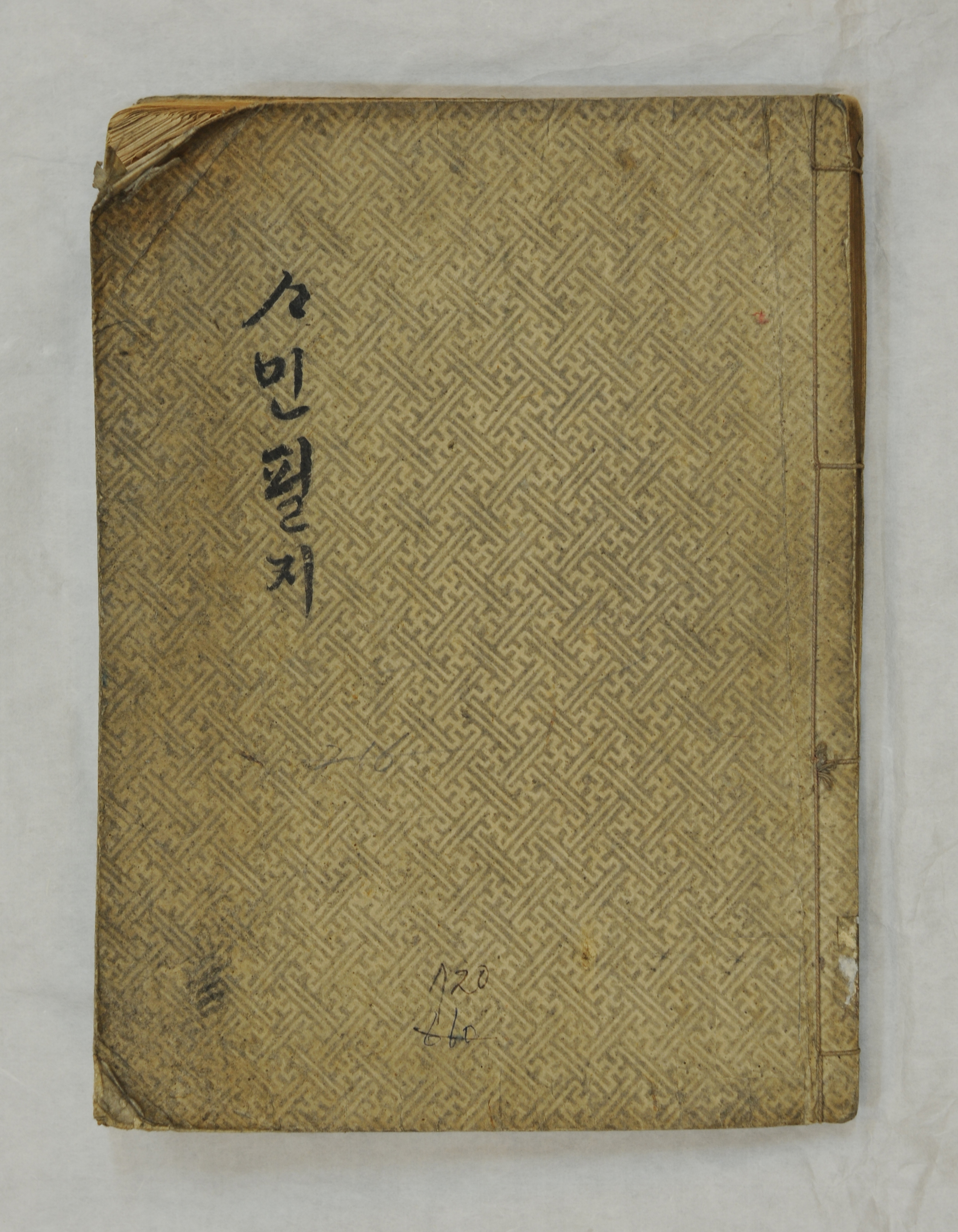
Cover of <SaMinPilJi>
Advocate of Hangeul/<SaMinPilJi>, the First Textbook in Korean History
While teaching in Royal College Dr. Hulbert almost mastered Korean language in two years after the arrival in Korea, and challenged to write a modern book in Korean 3 years after the arrival in Korea. Thus he published <사민필지SaMinPilJi>(meaning ‘Knowledge Necessary For All’) in January 1891, the first textbook in modern style, furthermore in Hangeul. The 170 paged book contains modern ideas that are being taught in western countries(but never taught in Korea who focussed on only Chinese ideas), which was prerequisite for Korea’s modernization.
He also digged the superiority of Hangeul and defined Hangeul as ‘the finest alphabet in the world’ after the comparison of Hangeul with 200 other alphabets over the globe. He eventually concluded on Hangeul as saying, “Korean alphabet scarcely has its equal in the world for the simplicity and phonetic power.” Dr. Hulbert also explored the background of the creation of Hangeul and labelled King Sejong who invented and publicized Hangeul in 1446, as the most shining leader for the enlightenment of the suffering people who are using Chinese characters which is one of the hardest characters to learn. He wrote many articles about the superiority of Hangeul and contributed an article titled <The Korean Language> to <New York Tribune> in 1889 where he introduced real Koran alphabet shapes. Most importantly he implored Koreans to use Korean alphabet stopping using Chinese charater which is so difficult to learn and to use. With his obstinate insistence for the use of Hangeul, Koreans, especially noble classes, were awakened to use Hangeul gradually and grammar of Korean alphabet became systemized.
Dr. Hulbert also studied the origin and characteristics of Korean language and appreciated the value of it by concluding that “In this respect Korean language surpasses English as a medium for public speaking.”
He, with the power of Korean language ability, naturally became closely acquainted with King Gojong through which he later served three times as secret envoy of the Korean Emperor(Gojong became the Emperor in 1897 with the foundation of new Empire called Daehan), which is unprecedented in Korean history.
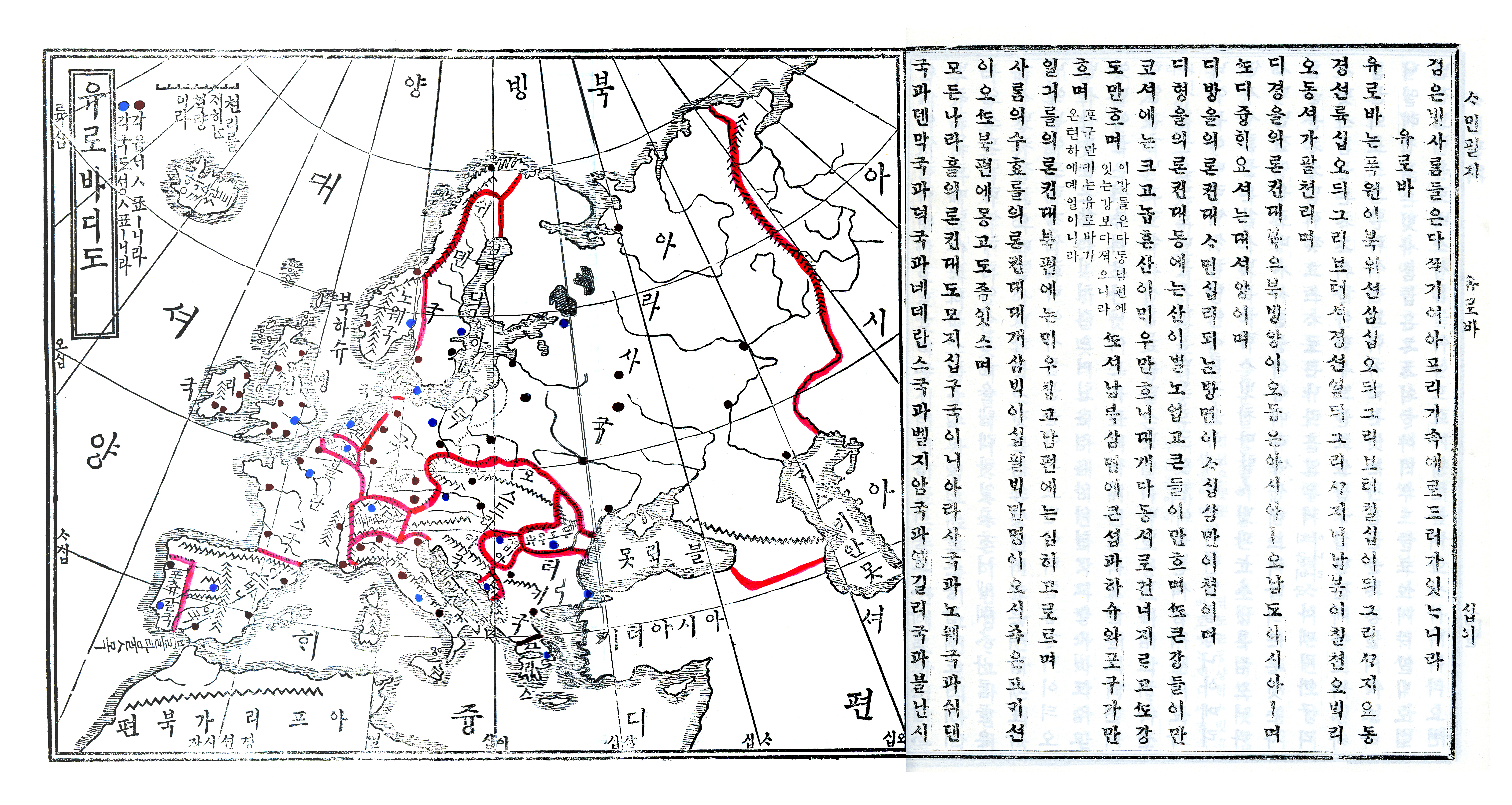
Europe part of <SaMinPilJi>
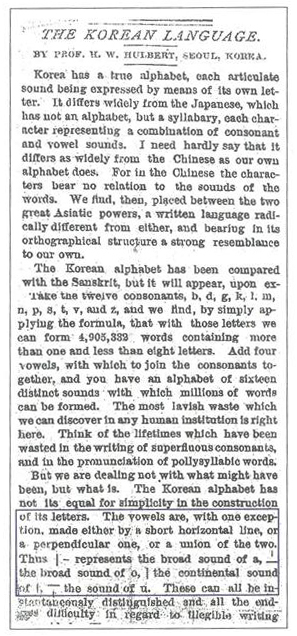
Homer Hulbert’s article <The Korean Language> contributed to <New York Tribune> in 1889. This is the first article ever written on the Korean language.
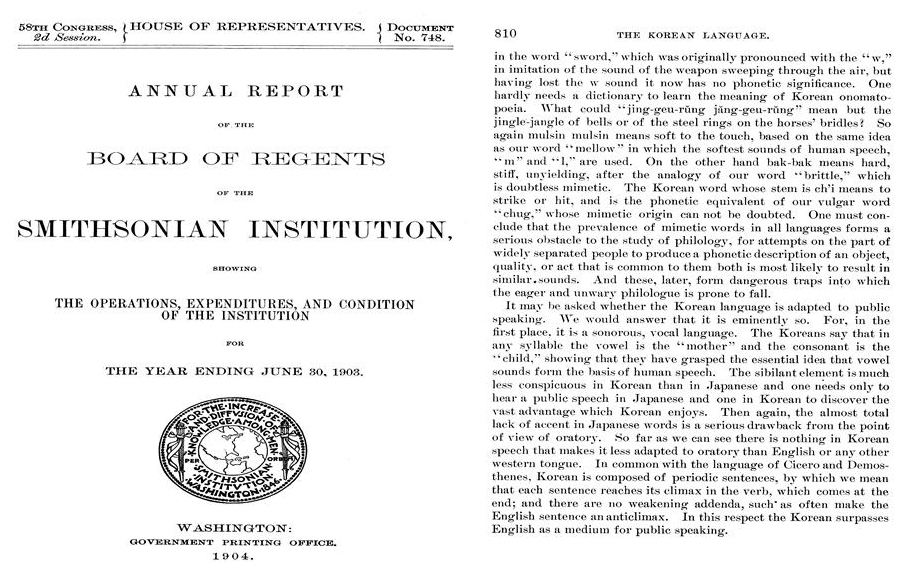
Homer Hulbert’s article contributed to <Smithsonian Institute Annual Report> in 1903 where he insisted that Korean surpasses English.
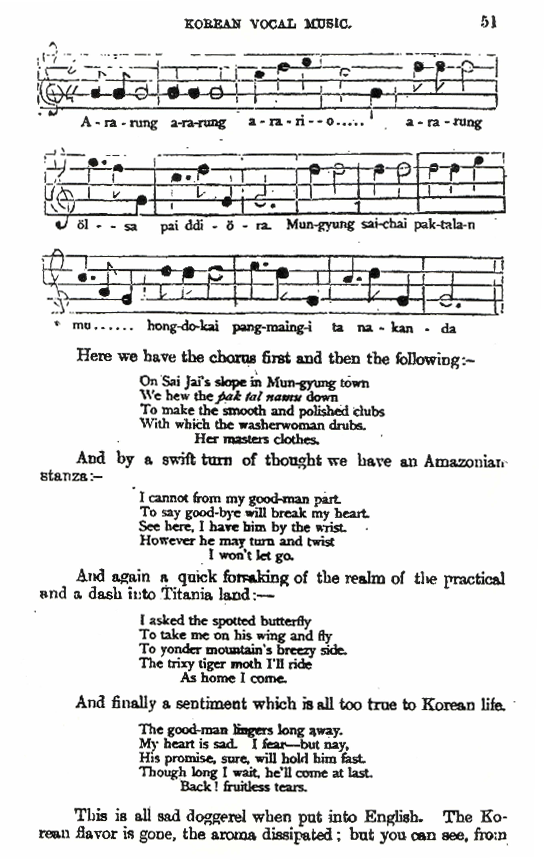
Arirang with musical scores Hulbert made up
Modernizer of ‘Arirang’, the Most Famous Korean Folk Song
Dr. Hulbert phenomenally contributed to the advancement of Korean music. Korean music have been sung and inherited down through generations without having western style musical scores. But just listening to, Homer Hulbert made up musical scores to Korean folk songs, opening new era of Korean music. He, in 1896, wrote an article titled <Korean Vocal Music>, where he highly spoke of Koreans with musical talents saying, “Koreans become poets like William Wordsworth when they sing, and they are master of the improvisation.” In this article Hulbert, for the first time in Korean history, made up musical scores on 아리랑Arirang, an ace-high folk song even today, and also recorded lyrics. He said in the article that Arirang will be the lasting song for Koreans, which turned out true today.
Pioneer of Korean Studies
Dr. Hulbert also excavated Korean history, culture, literature, arts, etc. in depth and discovered the ethnic brilliance of Korean people. He wrote numerous articles on Korea and contributed to scholarly journals. Most importantly he, for the first time in history, wrote a comprehensive Korean history from ancient Dangun times to modern times. He, after 15 year study of Korean history, published <The History of Korea>, 800 paged two volume book, in 1905. Dr. Hulbert insisted in the book that none of Korean dynasties were established at the intervention of foreign countries, that Koreans have so maintained unique history that their culture is on their own. And the next year he wrote another masterpiece <The Passing of Korea>, which covers all Korean cultures and literature, arts, music, etc. Dr. Hulbert, in this book, revealed full story of the background of unlawful Eulsa Protectorate Treaty between Korea and Japan signed on Nov. 17, 1905 at the Japanese sword pointing on Korean ministers. He also strongly blamed America for their support of Japan for this treaty in violation of Korea-U. S. Treaty agreed in 1882 where U. S. is to support Korea if Korea is intervened coercively by third country.
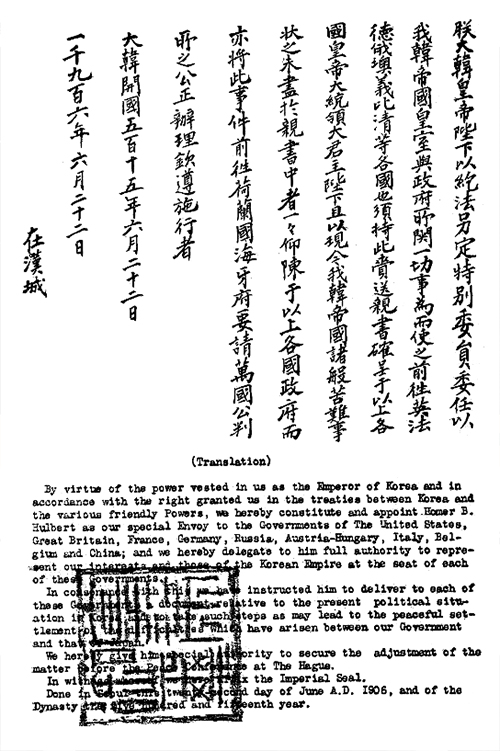
The Emperor’s Special Envoy Certificate for the 1907 Hague Peace Conference
Hidden Hero of Korean Independence
While living for Korea for 63 years Homer Hulbert’s most shining contribution to Korea is his strenuous and inexhaustible fight against Japan for the recovery of Korean sovereignty. In fact he worked for 50 years for the independent sovereignty of Korea from 1895 to 1945, which is a very unique case even including Koreans. He became night watch for King Gojong to protect him from pro-Japan conspirators in 1895 right in front of king’s sleeping room with a pistol on hand.
In 1905 he was a special envoy of the Korean Emperor to American President Theodore Roosevelt in 1905 to seek America’s support of Korea as stipulated in the Korea-U. S. Treaty signed in 1882. As Roosevelt administration dismisses Korea’s request, in accordance with the treaty, for the support to block Japan’s protectorate plot, Dr. Hulbert strongly blamed President Roosevelt for his betrayal of Korea via newspaper including <New York Times>.
He also served as special envoy to 9 state heads with which Korea signed the treaties in 1907 and played focal role in dispatching three secret emissaries to the 1907 Hague Conference for International Peace to appeal to the Western powers to help stop the Japanese dominance. Influenced by Japan, however, the Western powers blocked the entry of Korean representatives to the conference, and the mission failed. Right after this incident Japan forced abdication of Emperor Gojong and also expelled Hulbert from Korea and he returned to the United States.
In 1919, after the outbreak of the 3.1 revolution, a Koreans’ uprising against Japan, Dr. Hulbert filed a statement titled <What About Korea?> with the Senate’s Foreign Relations Committee where he request the U. S. to force Japan to return Korea to the independent state as it was. He continuously asked for the recovery of Korean independence in the U. S. for 38 years by writing to journals and addressing to people in America and Canada until 1945 when Korea was liberated.
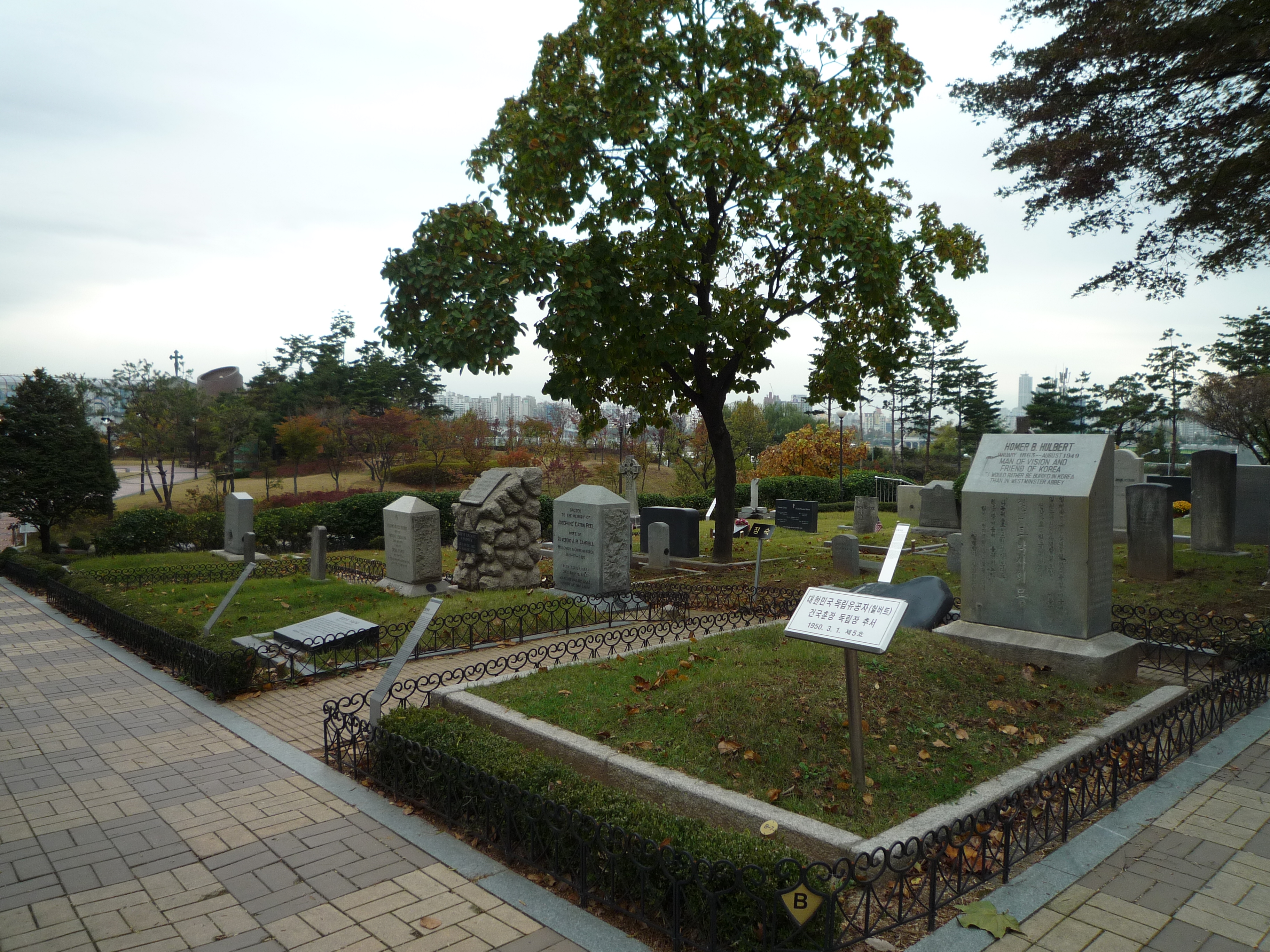
Hulbert’s tomb
Return to Korea in 40 Years and Buried in Korea
Hulbert returned to Korea after Korea’s liberation at the Korean president’s state invitation in 1949, but he developed pneumonia and died in 7 days after the arrival by ship in Incheon. Hulbert's tombstone reads “I would rather be buried in Korea than in Westminster Abbey.” as he had prayed. He is interred at YangWhaJin Foreign Cemetery in Seoul. He was honored by Korea with the Order of Merits for National Foundation(건국공로훈장) in 1950 and also with the Golden Order of Merit for Culture and Arts(금관문화훈장) in 2014. He is also the first recipient of Seoul Arirang Award(서울아리랑상).
-
1863
- 1. 26Born in Vermont, America as the second son of Calvin Hulbert, Congregational Minister and President of Middlebury College, and Mary E. Woodward, great-grand daughter of the founder of Dartmouth College. Grown in a strict Calvinist morality, a love of the human and the humorous, and a conviction that character is more fundamental than victory
-
1884
- Graduated from Dartmouth College. Entered the Union Theological Seminary in New York(dropped out after two years to come to Korea)
-
1886
- 7. 5Arrived in Korea to be a teacher at ‘YukYoungGongWon’(Royal College), the first state-run modern school in Korea
-
1888
- 9. 18Married to May B. Hanna at Grace Presbyterian Church in New York city
-
1886
- ~1891Studied Korean language and Korean history(pioneer of the Korean studies). With the fluency of Korean language, built up friendship with Koreans including king Gojong
-
1889
- Formed Seoul Union Club, a sporting club among foreign society
-
1891
- Published <SaMinPilJi(Knowledge Necessary for All)>, a gazetteer of the world, the first textbook in Hangeul(Korean alphabet) in Korea, for the enlightenment of Korean people
- After 5 and half year teaching, returned to U.S. via Europe
-
1892
- Took charge of Putnam Military Academy, Ohio
-
1893
- 10. 1Came back to Korea as a Methodist missionary and was appointed the manager of Trilingual Press, a publishing house of the Methodist mission. Taught at Paichai college
- Pastor of Baldwin Chapel(Currently Dongdaemun Church)
-
1895
- Business Manager of <Korean Repository>, then only monthly periodical in English
- Together with other missionaries, he was a special guard for king Gojong at king’s bedroom after the assassination of queen Min by the Japanese, to protect the king from the danger of murder
-
1896
- Made up musical scores of ‘Arirang’, the most popular Korean folk song sung by the people without scores, for the first time in Korean history
- Supported Philip Jaisohn for the inauguration of the <Independent>, the first newspaper in Hangeul in Korea. Served as editor for English version of the Indpendent
-
1897
- Appointed to the principal of the HanSeong(Seoul) Teachers College, also being the educational advisor to Korean government
-
1897
- ~1905Focused on the education under strong support of the Korean Emperor and developed the textbook system under the ‘Hulbert Textbook Series
-
1898
- Special correspondent of <The Times(London)>
-
1899
- Elected to a Fellow of the Royal Geographical Society, London
-
1900
- Teacher of the first state-run middle school(currently GyeongGi High School)
-
1901
- Inaugurated <Korea Review>, monthly English periodical which run until 1906
-
1903
- Published <DaeDongGiNyeon>, first history book on Joseon dynasty
- Chairman of Advisory Committee for Foundation of YMCA. And the chairman of the General Assembly to inaugurate Korean YMCA
-
1904
- Special correspondent of <Associated Press>
-
1905
- Published <The History of Korea> in English, the first comprehensive history book in Korea
- Published <A Comparative Grammar of The Korean and The Dravidian Languages>
- As special envoy of the Emperor, visited the U.S. and attempted to deliver the Emperor Gojong’s personal letter to President Roosevelt of the U.S. to prevent Japan’s unilateral protectorate over Korea
-
1906
- Published <The Passing of Korea>, all about Korea.
- 6Appointed to special envoy of the Emperor visiting state heads of treaty countries including America, Russia, U.K., Germany, France for the participation in Peace Conference to be held in The Hague in 1907 to block Japanese usurpation of Korea
-
1907
- 4Protested, through international press and journals, to Japanese government to return the stone pagoda stood at GyeongCheonSa temple located near GaeSeong, which was unlawfully taken to Japan by a Japanese minister. The pagoda later returned to Korea
- 5To carry out the role of special envoy of the Emperor Gojong and to support Korean delegation(Yi SangSeol, Yi Joon, Yi Wui Jong) attempting to attend the Peace Conference held in The Hague, Netherlands, Dr. Hulbert left Seoul for The Hague via Japan, Russia, Europe and arrived in The Hague on July 10th. He met Korean delegation and addressed at the Peace Club on the Japan’s injustice in Korea and the invalidity of the Protectorate Treaty, signed at the sword of Japan between Japan and Korea in 1905
- 8Visited Washington D.C. to Persuade President Roosevelt to support Korea against Japan. The frustrating news came to him that the Emperor was abdicated forcefully by Japan for the dispatch of the envoy. The Hague incident blocked him from coming back to Korea, being in exile in U.S.
- 8Settled in Springfield, Massachusetts. Since then he had spoken out on Japan’s injustice via contributions to journals, and lectures
-
1909
- Secretly visited Korea with 2 secret policemen. Delegated by the Emperor Gojong to withdraw Emperor’s private money deposited at Deutsch Asiatic Bank in Shanghai. The mission failed as Japan already took the money out and returned to the U.S.
-
1909
- ~1945Demanded Korea’s independence through lectures and public addresses in Chautauqua Circuit, YMCA, as well as via contributions to journals.
-
1919
- 8Filed with the U.S. Senate Foreign Relations Committee a statement titled <What About Korea?>, an extensive recital of ‘Japanese Brutality in Korea’
-
1942
- 3Demanded Korea’s independence in the Korean Liberty Conference held in Washington D.C.
- Asked for the approval of Korean Provisional Government with Syngman Rhee, Ohio
-
1948
- Wife May passed away
-
1949
- 7. 29Returned to Korea at the state invitation of Dr. Syngman Rhee, the first President of the Republic of Korea, to participate the ceremony of Korean Liberation Day(Aug. 15th)
- On August 5, passed away at Seoul Adventist Hospital
- On August 11, the funeral service(SaHoeJang) was held at full sorrow of Koreans
-
1950
- 3. 1Honored with the Republic’s Order of Taeguk for his contribution to Korea
-
1999
- 8. 5The ‘Hulbert’ name in Korean on his tombstone, which has been vacant for 50 years, was newly filled being inscribed with President Kim Dae Jung’s handwriting
-
2013
- 7Honored as the ‘Independence Patriot of the Month’ for July 2013 by Korean Government.
- 8. 13Hulbert/Arirang Monument was erected at Mungyeong city to commemorate his contribution to Arirang, the most famous traditional folk song in Korea
- 12. 27Seoul city government dedicated ‘Joo SiGyeong/Homer B. Hulbert Hangeul Monument’ in recognition of their contributions to the development of Hangeul(Korean alphabet) at Jongro-gu, Seoul, Korea
-
2014
- 10. 9Honored with the ‘Golden Order of Merits for Culture & Arts’, the highest medal in the fields of culture and arts, from Korea.
-
2015
- 10. 7Seoul Arirang Festival honored Dr. Hulbert with the 1st 'Seoul Arirang Award' in recognition of his contribution to Arirang